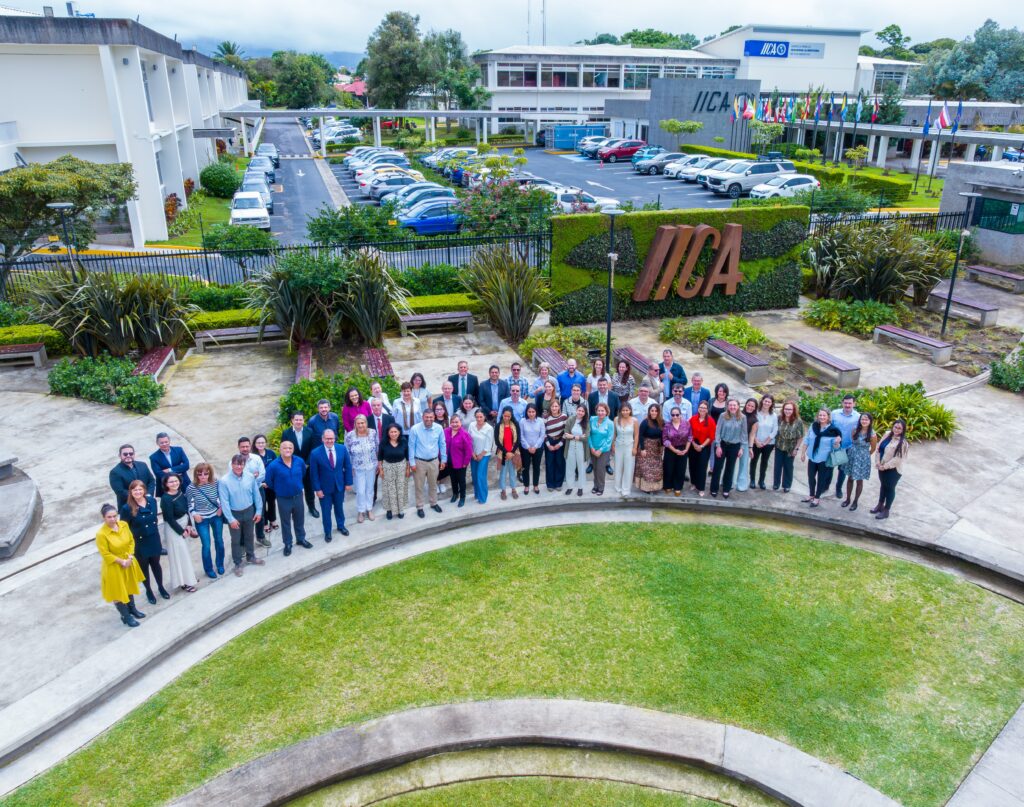
San José, Costa Rica, 21 July 2025 (IICA)– The Latin American and Caribbean Association of Animal Feed Industries (Feedlatina) and the Inter-American Institute for Cooperation on Agriculture (IICA) promoted, in a participatory meeting of animal health authorities, the harmonization and alignment of regulatory processes in animal nutrition with the goal of facilitating trade and improving regulatory efficiency.
These actions, in support of the growth and stability of the animal production sector in Latin America and the Caribbean, took place during the 5th Latin American Workshop on Regulatory Affairs in Animal Nutrition, held at IICA Headquarters.
The event brought together around 70 authorities and experts in animal health from across the region, creating a space for consensus-building, knowledge sharing, and fostering synergies between the public and private sectors on regulatory issues.
The main objective of the meeting was to promote regulatory alignment in animal nutrition across Latin American and Caribbean countries. Regulatory convergence aims to reduce technical trade barriers, streamline product registration, and ensure common standards for quality and safety.
The initiative responds to the need for more efficient and compatible regulatory frameworks that allow for greater regional integration and promote the sustainable development of the agri-food sector.
Feedlatina is an association that brings together companies and representative entities from the animal nutrition sector across Latin America and the Caribbean. It comprises approximately 40 companies and organizations seeking greater integration among Latin American countries and a more structured international presence in the animal nutrition sector.
Headquartered in Montevideo, Uruguay, Feedlatina operates with the support of organizations such as FAO, IICA, IFIF, WOAH, ALA, ABPA, and CLANA, among others. Its current member countries are Argentina, Brazil, Chile, Colombia, Costa Rica, Cuba, Ecuador, Mexico, Paraguay, Peru, and Uruguay.
At the event, Feedlatina President Roberto Betancourt stated that this meeting demonstrates that Latin America and the Caribbean are united, cooperating, and advancing toward greater regulatory harmonization in animal nutrition. He also said the presence of government and industry representatives from across the region is clear evidence of a shared commitment to more sustainable, safe, and technologically advanced production.
“Today more than ever, the alliance between the productive sector and regulatory bodies is fundamental. We are proud to work side by side with governments to ensure that innovation reaches the field in an agile and safe manner,” Betancourt concluded.
Meanwhile, Fernando Vargas, Costa Rica’s Vice Minister of Agriculture and Livestock (MAG), explained that the Central American country has a robust legal framework that ensures the safety and quality of animal feed, reflecting a strong commitment to public health and agricultural sustainability.
“This Workshop represents an invaluable platform to share knowledge, strengthen professional networks, and advance toward more sustainable, efficient, and harmonized animal nutrition in our region,” he concluded.
Lloyd Day, Deputy Director General of IICA, emphasized that the discussions held at the meeting will be essential to reaffirming the vital role of livestock farming in the environmental, social, and economic sustainability of nations in the Americas.
“This meeting is a key platform to strengthen technical cooperation in animal nutrition—an essential topic for the sustainability of livestock farming in our region. The Americas, from Canada to Argentina, share a livestock vocation that we must continue to foster through dialogue, science, and well-coordinated public policy,” Day added.

Luis Matamoros, Director General of the National Animal Health Service in Costa Rica; Pablo Azpiroz, Executive Director of Feedlatina; Lloyd Day, Deputy Director General of IICA; Roberto Betancourt, President of Feedlatina; Fernando Vargas, Vice Minister of Agriculture and Livestock of Costa Rica; and María Febres, IICA Representative in Costa Rica.
In his remarks, Luis Matamoros, Director General of the National Animal Health Service (SENASA) in Costa Rica, stated that the institution is committed to a strong sanitary regulatory framework that ensures the safety, sustainability, and competitiveness of the livestock sector.
“Animal health is a fundamental pillar for food security and sustainable development. Spaces like this allow us to share experiences, align technical criteria, and build bridges between the public and private sectors and academia. Only by working together can we respond to global challenges with effective regional solutions,” said Matamoros.
Regional cooperation to strengthen animal nutrition
Pablo Azpiroz, Executive Director of Feedlatina, emphasized that Feedlatina’s mission is to serve as a bridge between the public sector, the productive sector, and the international community.
“We travel across the region promoting regulatory harmonization and highlighting the strategic value of the agri-food chain, which is essential for the sustainable development and food security of our nations,” Azpiroz added.
María Febres, IICA Representative in Costa Rica, noted that IICA promotes organization and cooperation as pillars of agricultural development.
She added that Feedlatina is an example of how, by standing together, Latin American countries can make their voices heard, propose joint solutions, and face global challenges—such as sustainability and food security—with greater strength.
More information:
Institutional Communication Division.
comunicacion.institucional@iica.int











